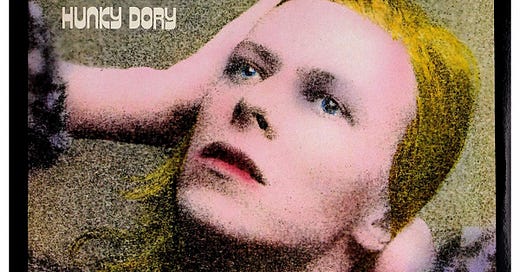He's Chameleon, Comedian, Corinthian and Caricature
David Bowie - 'The Bewlay Brothers' - (Hunky Dory - 1971)
There's a creaking chair in the intro to the "Bewlay Brothers" before the acoustic guitar starts. I like to think it's a doorway to David Bowie's mind, pushed ajar. Only a little but enough for one of his most dense and impenetrable songs to spill out.
Bowie recorded it on 30 Jul 1971 - one of the last Hunky Dory songs committed to tape and written in the studio. He was initially dismissive of it- "A song for the American market1." because "the Americans always like to read things into things", even though the lyrics "make absolutely no sense"2
It wasn't until 2002, for the BBC, that Bowie played the song live and even then, he complained about how verbose it was;
There are more words in it than Tolstoy's War and Peace.
The song has a threatening element alongside an air of grace and charm. There's a solemn acoustic guitar intro and warped piano at the start, and by the end, a chorus of muppets, or potentially laughing gnomes, serenade us.
People have speculated on exactly what the song is about for half a century now - some have spoken on it as an allegory on cross-dressing or homosexuality - most agree the song itself is about Terry Burns. Burns was Bowie's schizophrenic half-brother, and it was around this time that he pulled away from him before eventually cutting off contact with him.
With the ultimate fate of their relationship not clear at the time, it is intriguing that lines like "My brother lays upon the rocks/he could be dead, he could be not…" stand out 50 years later. We also have lyrics that some speculate3 are memories of Terry's seizures that "... frighten the small children away."
Given Bowie has said little on the song in his lifetime compared to others, we may never know the full detail, but we can talk about what it might mean. Terry seems the most likely subject given that Bowie had already written about him on The Man Who Sold The World's 'All The Madmen'.
We also know that Hunky Dory's largely acoustic and sparse second half is its tribute half. Songs on that side deal with obvious tributes to Bob Dylan, Andy Warhol and Biff Rose, and the Lou Reed tribute of the penultimate song4. Hence, while it is tempting to peg, the full lyric is autobiographical; we should probably steer back slightly from that. After all, the title is referencing a tobacconist,
The impression you get from how Bowie talks about Terry and his influence on him is almost a ghostlike description before he even passed away. A haunting, ghostly refrain is perhaps the most appropriate way to acknowledge him and finish what would be Bowie's breakthrough album and one of his best-loved records.
Thanks should be noted to Chris O’Leary and his blog Pushing Ahead of the Dame (and the subsequent books) which unpicked this song, one of Bowie’s most fascinating, better than most had in the 40 years beforehand.
https://en.wikipedia.org/wiki/The_Bewlay_Brothers
https://bowiesongs.wordpress.com/2010/04/09/the-bewlay-brothers/
https://bowiesongs.wordpress.com/2010/04/09/the-bewlay-brothers/
Queen Bitch is of course a song indebted to sound of the The Velvet Underground and that type of guitar riff that Mark Ronson plays is much more prevalent on Bowie’s next album, The Rise And Fall of Ziggy Stardust and The Spiders From Mars.




